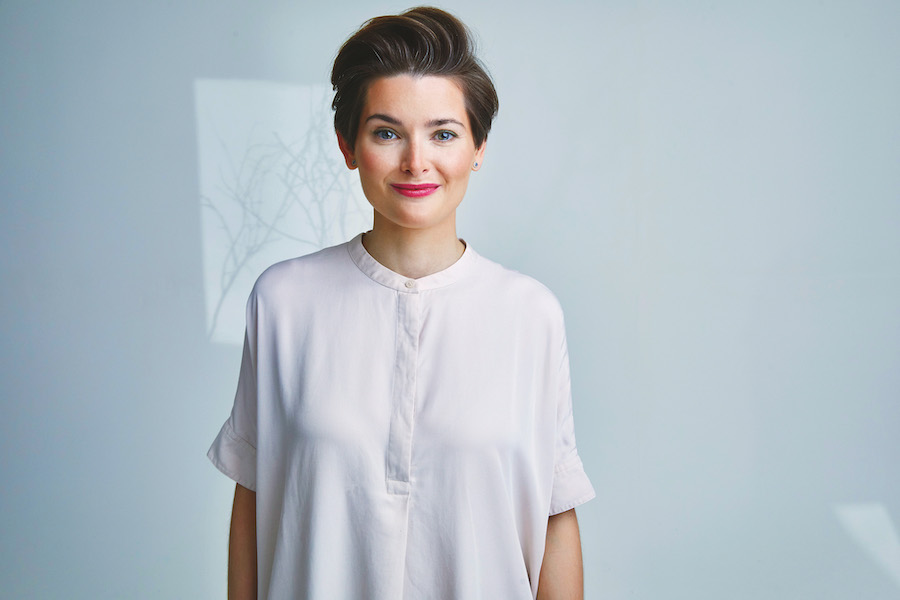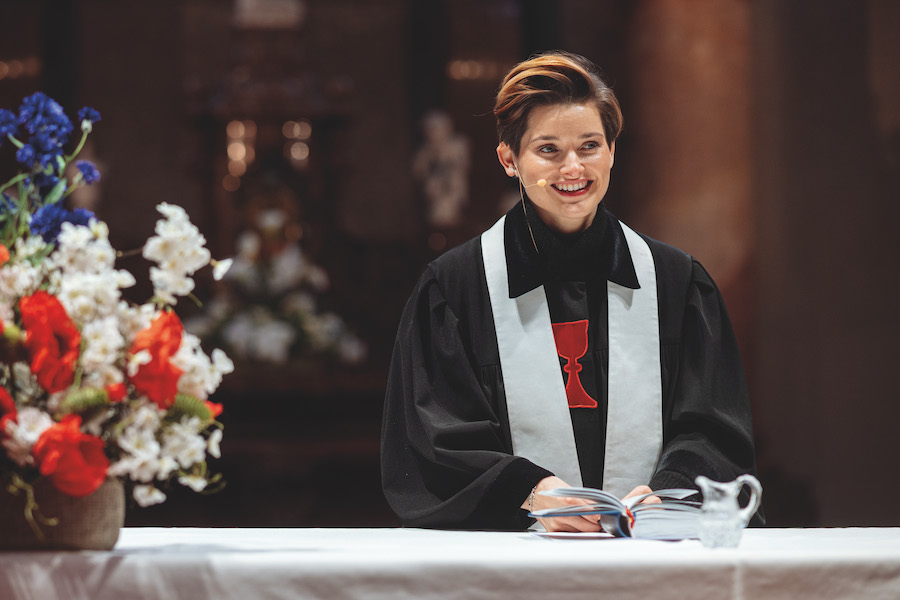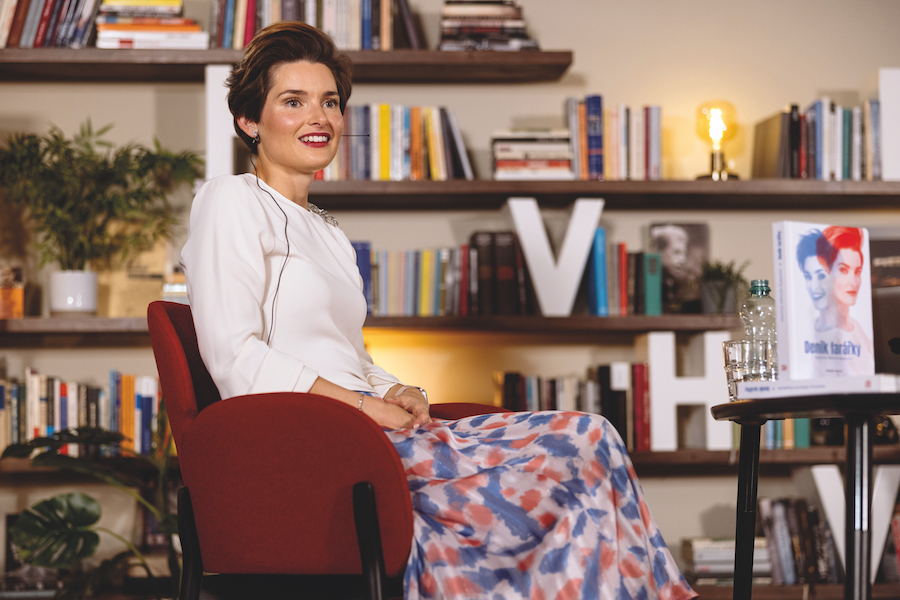“DIVERSITY is ENRICHMENT, not a RISK”

Martina Viktorie Kopecká – Photo: Petr Weigl
A woman amongst men. Literally. Martina Viktorie Kopecká is a priest of the Czechoslovak Hussite Church. She studied theology, psychology, and special pedagogy. She is active in the international ecumenical movement and serves as chairwoman of the young generation ́s ECHOS – an advisory body to the World Council of Churches. In 2018, she was the one representing the WCC at the Catholic Synod in Rome. Last year, she published a book called Deník farářky (Priest ́s Diary), and with her dancing partner Marek Dědík, placed second in the StarDance TV competition.
I am sorry, but before I start with a traditional question, I have to ask when did you last dance? What was your experience like, leaving your comfort zone? And did your popularity have an impact on attendance at your God ́s services?
Before the season of StarDance finished, I perfectly understood that after Christmas a “time without dancing” would await me. So, at the finals it was the last time I danced in pairs. This was followed by a running period I could not stand still. I was listening to music from the (dance) training and would imagine myself dancing. Now, I am at home with COVID, just happy to be able to get my tea from the kitchen. Dancing changed my opinion about what my body is capable of by a lot. The physical aspect of the competition was as difficult as the mental one, yet I did not regret taking part in the project for a single moment. Marek Dědík was an amazing partner to me, and I do not exaggerate when I say he basically treated me like a princess.
He helped me in all the situations when I was feeling fragile. We did not waste our time on criticism, and started every training session smiling. We made coffee for each other, did not arrive late, cheered each other up, mourned everybody who had to go. My favourite was dancing barefoot, in our scenic dance where we portrayed the situation of a soul inviting a body for a dance, where both dimensions join to help man overcome the hard times. Our free dance ́s theme was a black swan I wanted to think about what it was like being a black swan, facing up to a shadow that we all have inside, and drawing attention to the fact that a soul can also hurt and get ill. Other dances, those “in shoes”, were a great challenge for me. Sometimes I coped better, other times worse, but the longer we continued competing, the harder it got – suddenly, you do not have a month to practise your dance but three days, and every Saturday was a little premiere for us, in a new dress, with new music. But we were all in it together and it helped. We also had to handle stress caused by the instant risk of getting infected by COVID. Every Sunday morning I was exhausted but happy that I could return to service and do what elevates my mind, even though my whole body was sore. It was already quite full in the church before StarDance, and surely a few came just because they saw me dancing on TV the night before. For me, though, the essential thing was the support from the people who make up the religious communities in the church and chapel where I serve, as well as the fact that my colleagues and superiors also stood by me.

Photo: Lukáš Bíba
And now the traditional question – how do you feel working in a man ́s world?
If that means the church, then it is not a man ́s world. Well, maybe when you look at my photo from the Roman Catholic Church session at the Synod of Bishops in Vatican 2018, it might look like that, but, in the end, I do not feel like I am a type of minority as a serving woman. The Czechoslovak Hussite Church has been consecrating women for over seventy years, and other churches have also had women priests and deacons in both our country and abroad. That is good, it turns out that the diversity of the team a plurality of approaches and opinions is enrichment, not a risk for the whole.
The pandemic is getting too long. There have been many discussions about the first phase uniting us, bringing great solidarity. The following phases then brought a shadow pandemic in the form of increased domestic violence, polarization in our society, and mental problems experienced by both children and the elderly. Besides pastoral work, you are engaged in family therapy treatments. How do you perceive the state of today ́s society?
The situation is fragile. Many times, we found ourselves at a point where we were convinced that everything was going to end soon. And disappointed, after some time, we found ourselves in the deep grip of anxiety yet again, with frustration turning into aggression now and then, and our optimism gradually facing the reality of things. I think we learned a lot about ourselves. The question is ‘how are we doing in terms of resilience and the ability to act in a time of crisis?’. Many people kept helping, others learned how to ask for help, we learnt a lot about what we need and how we can help each other. But we also learned about the vulnerable and weak spots, like distance learning, which did not really suit most children who I talk to during therapy. However, this is not some relevant statistics I rather want to say that instead of searching for solutions, many adults simply gave up and left the children in that situation alone. As for relationships, we were subjected to various tests and now have to deal with the marks we ourselves put on our own report card. I do not want to generalize, but what was about to fall, fell and broke. On the other hand, I heard a lot of good news about the “last straw” helping some people finally make decisions and stand up for themselves. Every cloud might have a silver lining. The sad truth, however, is that the number of funerals I had served in my ten previous years of work combined was lower than those I had served over the last year alone.
I like your invitation to God ́s services. But how do you give faith, strength, and hope to those who do not believe?
I sometimes say that life is worship and worship is life. But spiritual experiences are awaiting us outside a church too it might even be easier to experience them in places where we do not expect them. I think priests should not “shut” themselves in the parsonages but make themselves especially available in everyday life, outside of the church environment. We all have our own value system that we cling to, whether we are believers or not. It is good to revise our priorities, cultivate our expression, actions, and thoughts, to meet people we resonate with, but also those whose views are different it is the only way we can evolve, and see the steps behind, which constitute our life journey. Many would say that love and relationships are somewhere at the top of their value system. And love is also experiencing a dialogue if we keep working on focused listening and simultaneously express ourselves thoroughly and authentically, then we can be sure that this way we will take care of the relationships we live in. We need to create space for relationships and give them time and the same goes for spiritual life, no matter which religion is involved.

Photo: Lukáš Bíba
What social topic, in your opinion, is currently neglected?
Each person will probably have a different opinion on it; besides, I feel that all topics I am really sensitive about are discussed a lot: critical thinking (and in dialogue with theology as well), stereotypes regarding genders and minorities, or the spiritual life in the church and outside of it. I think, though, that what we could discuss even more is the un/availability of quality education at all levels, plus the issue of equal opportunities. Also, lately, I have been quite interested in the effect that regular exercise has on health and the psyche. I, a bookworm, was really surprised to find out how many positives exercise brings.
Besides pastoral and family therapy work, you write a Priest ́s Diary blog, host the TV series Uchem jehly (Through a Needle ́s Eye), dance… Do you have time to relax?
No. Or just at times when I really can ́t go on anymore. It is my captivity a trap I am setting for myself when promising more than I can manage. I am not very good at saying “no” yet. But it is also true that I enjoy doing more things I cannot imagine having just one field, just one focus, just one “pair of glasses”. While doing one, I am relaxing from the second, third, fourth… and so far, I am okay with having it this way. Time management is my greatest challenge, but an even bigger one is to accept only the challenges I really care for. I do not want to prove anything to anybody anymore but I really want to use my potential and expand my horizons. In the end, the dancing also came in handy. I started thinking about it from the ‘spiritual experience’ point of view. Everything in life is connected.
What are you looking forward to in 2022?
Finishing reading some books and starting writing some. And if it is possible, I would really like to travel again I miss it a lot!
Linda Štucbartová

